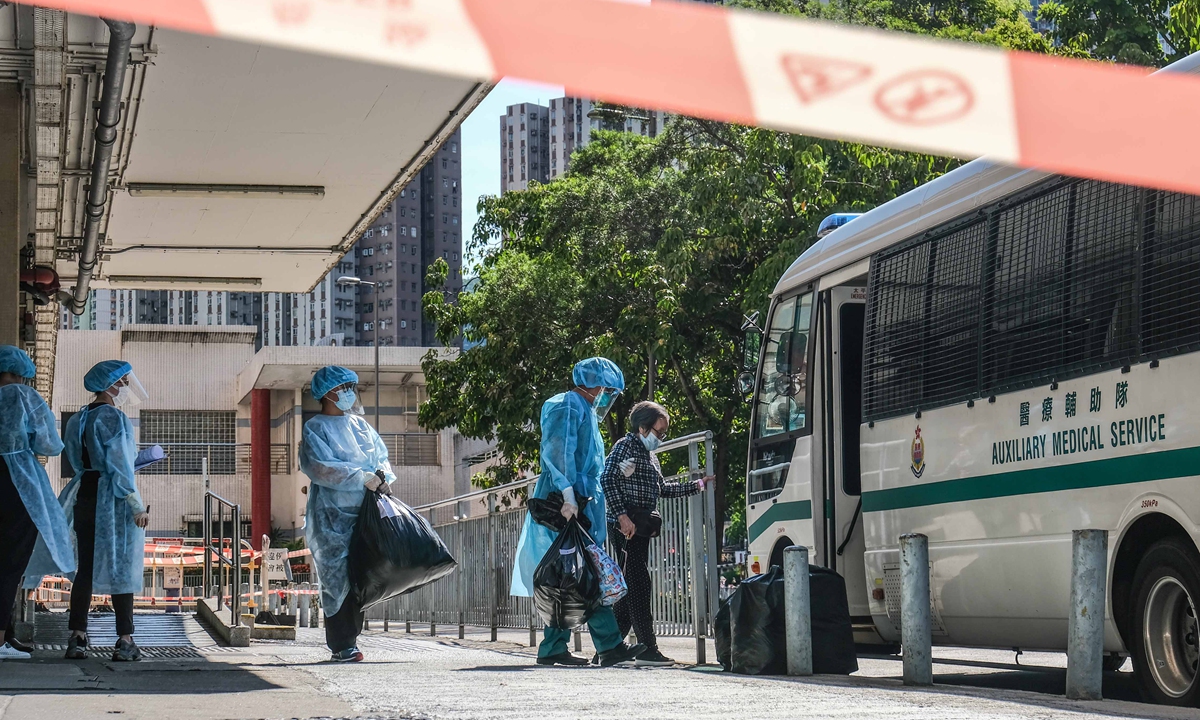Hong Kong needs city-wide testing to halt coronavirus outbreak: hospital chief
By Zhao Yusha Source: Global Times Published: 2020/8/4 0:14:16

Medical staff evacuate about 50 residents of the Salvation Army Lung Hang Residence for Senior Citizens in Sha Tin, Hong Kong on July 24, 2020, after a cook and a cleaning staff there tested positive for the virus. Photo: cnsphoto
City-wide tests for the coronavirus is the best and ultimate way to curb Hong Kong's outbreak of COVID-19, but the city's limited ability to conduct extensive testing and people ignoring virus prevention measures are holding back this option, said University of Hong Kong-Shenzhen Hospital chief Lo Chung-mau, noting that he hopes the mainland's assistance would help plug the loophole.
"I think city-wide test is the ultimate, and best way [to curb the coronavirus]… it's like a forest that has been swept by fire; massive testing will help find those without symptoms and prevent fire erupting again under the ashes," Lo said in an exclusive interview with the Global Times.
Lo said there have been too few tests, the results have been slow and the quality of the tests has been unsatisfactory. It takes an average of two to three days to get test results, while in the mainland it takes only a few hours, and these issues are in part why city-wide testing is not practical, said Lo.
The Hong Kong government has reported an average of 115.9 cases per day between July 28 and August 3. There have been 3,592 total infections and 37 deaths in Hong Kong since the pandemic began.
Lo said that unlike Chinese mainland where people receive throat swab test from medical employees on site, Hong Kong residents were given little containers to collect their saliva, which they return to medical staff for test.
This method has several shortcomings, said Lo. Hospital employees may mix up samples, the containers can be easily broken while residents transport them to a hospital; and some people may choose not to return the containers at all, said Lo.
He cited the example of one residential community where 3,000 containers were given to residents but only 1,000 were returned.
According to Hong Kong's department of health, the city's average daily testing capacity was only 3,646 in June, and the number increased to 8,454 in July, when community outbreaks were spotted.
Lo said that massive nucleic acid testing is necessary as it helps people see the spread of the virus, and will lead to more timely quarantine and treatment of people who are infected .
He stressed that the central government has very successful and abundant experience in curbing contagion in cities like Wuhan and Beijing, which also endowed it with an ability to help a virus-hit Hong Kong.
He is confident that the arrival of a mainland medical team, and help from three mainland testing agencies, will greatly boost the city's testing.
Seven medical experts from the mainland arrived in Hong Kong on Sunday. Yu Dewen, the team leader from neighboring Guangdong Province, told the Xinhua News Agency that the arrival of nucleic acid testing technicians from the Chinese mainland is likely to boost the daily testing capability to 200,000 from the city's current 10,000 per day.
Yu said that before engaging in testing, he and his team will talk to the liaison office of the Chinese central government in Hong Kong, the city's bureau of health, food and hospital authority. The team will also discuss the equipment and the work procedure of three mainland testing agencies, including BGI.
Lo also pointed out that building temporary hospitals is also necessary as Hong Kong has quarantined people with mild symptoms at home. "Most Hong Kong residents live in confined spaces. So once one member of a household is infected, it poses great danger to other family members. And if those members move around in the city, it poses a great risk all over the city."
Temporary medical facilities like Fangcang hospital will help the city isolate people who test positive, and relieve pressure of strained hospital beds.
As a Hongkonger, Lo said, "We are always ready to support Hong Kong, and ready to go at any time."
After news that help from mainland was coming to Hong Kong was released, opposition groups have politicized the move, spreading the rumor that the mainland wants to test and collect the DNA of Hong Kong residents in the name of epidemic prevention; and that medical employees from the mainland are not professional enough to help Hong Kong.
Lo said the groundless claims were made of political or business purposes, as some professional organizations are trying to politicizing the assistance in order to protect their own interest.
Lo said his hospital is the best example of cooperation between the Chinese mainland and Hong Kong. "Ask any of my Hong Kong colleagues and they will speak highly of their mainland peers."
Samples collected from people are only for nucleic acid tests, and there's no evidence or data that suggests the coronavirus samples are used in a nefarious way, said Lo, who urged other Hong Kongers to stop demonizing the mainland's help, adding that such behavior is holding back virus prevention work.
Posted in: HK/MACAO/TAIWAN